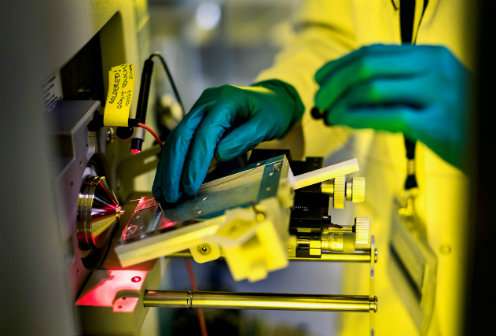Researchers uncover up to 100 potential drug targets for cancer

Protein researchers from the Novo Nordisk Foundation Center for Protein Research at the University of Copenhagen have used mass spectrometry-based proteomics to uncover a number of proteins that could play a critical role in propagating signals within cells that can lead to uncontrolled cell growth—one of the hallmarks of cancer.
The study, which has been published in Cell Reports, was conducted using mouse fibroblast cells. The researchers behind the study believe the results may prove important to the development of new so-called tyrosine phosphatase-inhibiting drugs for patients suffering from different types cancer, as well as other types of diseases such as Noonan syndrome.
Globally, cancer is one of the leading causes of death, according to the World Health Organization. In Denmark, one in every three Danes develops cancer at some point in their lives, according to statistics from the Danish Cancer Society.
The researchers focused on the protein communication and signalling that takes place inside the cells. Misregulation of protein signalling often leads to an increase in the production of tumours. By understanding the mechanisms and regulation of these signals, the researchers can specifically target the proteins responsible with drugs.
Using mass spectrometry proteomics to analyse the proteins of cells treated with various growth hormones in combination with advanced data analysis, the researchers discovered proteins that manipulate the communication processes inside the cells initiated by cell receptors and thus inhibit the development of cancer. When inhibited, the prominent protein Shp-2 caught the researchers' attention.
"This, in fact, leads to the deactivation of a very prominent cell growth pathway, which is the main pathway that people often try to target in cancer cells," Professor Jesper Velgaard Olsen from the research group explains.
At the beginning of the study, the researchers knew of a handful of proteins regulated by Shp-2. However, using the mass spectrometry analyses, the researchers discovered around 100 potential new targets, revealing a far more complexity than previously considered. Now, the researchers need to do further studies to determine the role and mechanisms of these proteins.
"Now, we are doing follow-up projects, looking specifically at leukaemia, where the cancer cells have mutations in these different receptors that can be regulated by Shp-2," says Postdoc Tanveer Singh Batth.
Cancer patients are often treated with tyrosine kinase inhibitors, which block pathways inside the cells to inhibit tumour growth. However, many develop resistance to current clinical inhibitors; thus, there is a substantial need to find new proteins that can be used as drug targets.
The researchers' new discoveries can be used in the development of personalised medicine, in which preventive treatments can be targeted at the patients' personal DNA or protein expression profiles. "It will be a drug that can be used only in a world with personalised medicine, where it will not be given to for example all leukaemia patients, but only to those with mutations in one of the receptor tyrosine kinases where we now know this Shp-2 protein operates," says Professor Jesper Velgaard Olsen.
Personalised medicine is gaining ground in Denmark. In 2016, the Government and the Danish Regions launched a strategy for efforts involving personalised medicine. A main part of the strategy is the establishment of a National Genome Center.
More information: Tanveer S. Batth et al. Large-Scale Phosphoproteomics Reveals Shp-2 Phosphatase-Dependent Regulators of Pdgf Receptor Signaling, Cell Reports (2018). DOI: 10.1016/j.celrep.2018.02.038


















